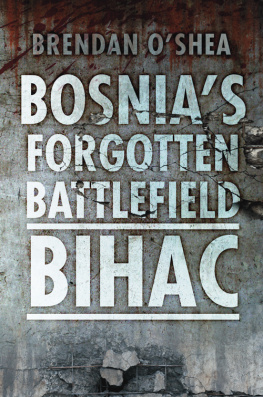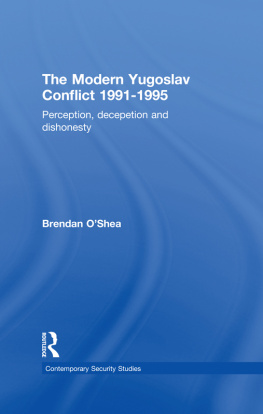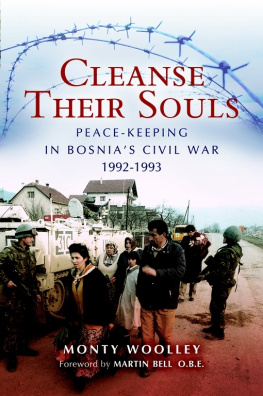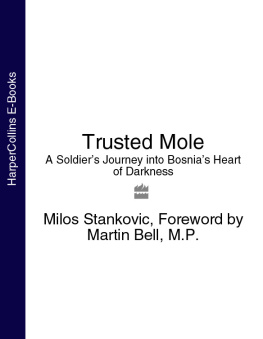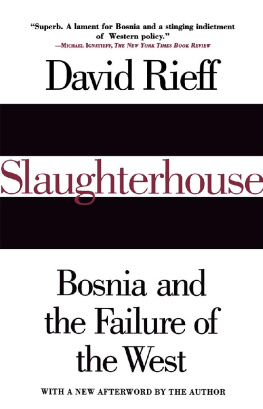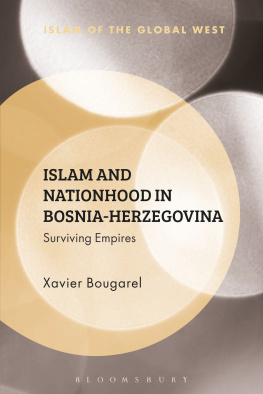
This book is dedicated to the memory of Major William Foxton, MBE OBE who died tragically on 10 February 2009 in Southampton, England. Bill was a vastly experienced professional soldier and one of the worlds true humanitarians all rolled into one, and without his daily, and oft times cryptic reports from Bihac in spring 1995, the European Community Monitor Mission would have remained completely blind to the reality of the situation on the ground. Bills courage, bravery and tenacity enabled those of us tasked with making assessments of the crisis to differentiate between the truth, and the ever increasing volume of spin applied to the facts by all parties to the conflict. In later years Bill continued his humanitarian work in Bosnia, Kosovo and Afghanistan and all who came across him never failed to be amazed at his breadth of knowledge on the one hand and his stark humility on the other, all coupled with a fantastic sense of humour. Bill Foxton was one of the good guys and I was privileged to know him, and to work with him for a time. Rest in Peace Bill. Take it easy and go fishing if you can. See you on the next mission wherever that takes us!
By the time this manuscript finally appears in print over three years will have elapsed since I first began a re-examination of the recent tragic events in Bihac and elsewhere throughout Former Yugoslavia. I could not have embarked on this project in the first instance had I not been fortunate enough to have worked in the region with ECMM, and accordingly my first vote of thanks must go to those Monitors who, down through the years, took the painstaking trouble to compile detailed reports and assessments of the ever-changing military and political situation. Equally but for the encouragement of Klaus Cramer, Jean-Michel Happe and Pearse McCorley I might never have had the opportunity to pursue my interest in what was really happening in Bihac Pocket, and in this regard I was ably assisted on several occasions by Lennart Leschley, Arne Nyberg, Jos Gannes, Patrick Brook, Andre Lejolly, Philip Wakins and Tim Clifton, who proved themselves loyal and trusted colleagues.
I was also fortunate to have had the best of team mates in Olaf Boersma, Rui Fererria, Julien Neil, Guilliano DAnastasio and Arturo Vinuesa, and between us we learned a great deal as we went about monitoring the situation on the ground. However, it is to all those who worked in Bihac and took the risks that I am most grateful, for without their commitment to remain in the Pocket under fire and to report daily what they saw and heard, there would of course be no story to tell now. Accordingly I remain indebted to each and every one of them but particularly to Hugh ODonovan, Mark Etherington, Anders Malsten, Henrik Markus, Francis Bonal, Luc Vermeulen and last but not least a remarkable Englishman called Bill Foxton.
I am also mindful of the support I received from the small Irish contingent in Zagreb during the winter of 1994, namely Mick Cleary, Joe Mulligan, Dave Galvin, Gerry Swan, Aidan OLeary, Susan Lyne, Liam Jenkinson, Tom Hodson, Eugene Field and later on Jim Fitzgibbon. Each in their own way have helped enormously along the way.
My thanks also go to Renaud Theunens and Roddy de Normann who at various points read the script and offered valuable advice on where and how to improve it. Neither would probably admit it but their combined contribution, comment, criticism and advice have proved to be of crucial importance. Similarly I am very grateful to Tim Ripley for pointing me in a number of important directions as the project neared completion and for sharing information with me which he might more profitably have reserved for his own work. Equally Philippe Graton made a huge effort to retrieve some of his excellent photographs which were taken on his visit to Turanj in 1994. I am delighted that we have been able to include some of them because they vividly illustrate the story.
I can also never adequately acknowledge the role played by Robert Fisk in this project. Many months ago he willingly agreed to write the foreword and true to form has kept his promise, but if the truth be told it was probably his continued infectious enthusiasm which was responsible for keeping me going, at times when the easier option by far was to abandon the whole thing. In this regard I must also acknowledge the latitude afforded to me by Dr Geoff Roberts at University College, Cork, which allowed me to concentrate on completing this work when time was at a premium.
At Sutton Publishing I wish to express my sincere thanks to my ever-patient editor Sarah Bragginton, and to Mike Komarnyckyj, who produced such excellent maps. However, in the final analysis, it was Jonathan Falconers courage which proved the determining factor in bringing this project to fruition and nothing written here could ever adequately explain or appreciate that fact.
Finally I wish to thank my parents Martin and Mary for their continued encouragement throughout, Kevin for his unshakable belief in my ability to see this through, and Clare, and Martin and Katie, for tolerating the amount of time I spent sitting before a computer when there were many other more valuable and pressing things to do.
To everyone mentioned above, and countless others too numerous to mention, I am indebted to you all.
Brendan OShea
4 June 1998
My friends, this is a difficult period for me. Someday someone will write a book about it. It is a very special responsibility to command an encircled unit.
General Atif Dudakovic
Commander, 5th Corps Armija
Bihac Pocket, Bosnia-Hercegovina
12 March 1995
Contents
One dark winters evening in early 1995, I watched the Serbs vainly trying to defend the town of Velika Kladusa from the Bosnian army. It was a miserable day, the trees and hedgerows rimed with frost, the Serb soldiers hollow-cheeked with hunger and tiredness. A dead dog sat at the roadside, staring at my car as I skidded slowly down the broken laneways. It must have sat down to rest one afternoon and simply frozen to death.I was to see it many times on that road, always watching, dead eyes open, as the rabble of Serb soldiery pulled their field guns down to Fikret Abdics great fortress.
Its battlements that day were shrouded in a grey mist as the thump of explosions shook the ground. Beside the roadway, Abdics Muslim troops and their Serb allies explaining these crazed alliances to newspaper readers in 800 words was always a nightmare were harnessing nags to the guns. The Abdic Muslims wore armbands to distinguish them from the pitiful Muslim prisoners from the Bosnian armys 5th Corps who were being marched up the icy road under the guard of men in Partisan hats. Some of the horses tried to bolt. It was a scene from the First World War. So were the local atrocities.
At a prison camp half a mile away, the Serbs showed us their latest captives; they were being forced to dig for mines with their bare hands. We are treating them according to the rules of war, a blue-uniformed Serb policeman announced to me, pointing to a warm barn which he claimed was their prisoners hut. I suspected it belonged to the camp guards. And while I walked past these cowed, fearful men, all pawing the ice-hard ground with their hands, the Serb gun batteries in the surrounding forests banged away into the fog. When I watched carefully, I could see a big, golden fire flicker behind the winter trees, their branches showing up for a millisecond like the veins in a corpse. Then the fog would cover them as the gun crew reloaded.
For a journalist, these battles and their attendant horrors were always accompanied by the awkward feeling that, even if the physical shape of war was explicable, the politics of the Bosnian conflict was impenetrable to readers. We often saw the men from the European Community Monitoring Mission in their white shirts and trousers spacemen, we called them hovering around the battlefields, observers of a grisly game whose participants were often happy to meet them or try to use them or lie to them and, on rare and terrible occasions, to kill them. From time to time, I would be given the opportunity of reading their carefully prepared, often grim, occasionally very eloquent reports. One day, I thought, they should write down their own experiences and use this wealth of documents to ensure that the base nature of this particular war was placed on the historical record. Brendan OSheas book is one of the first to do that.
Next page
